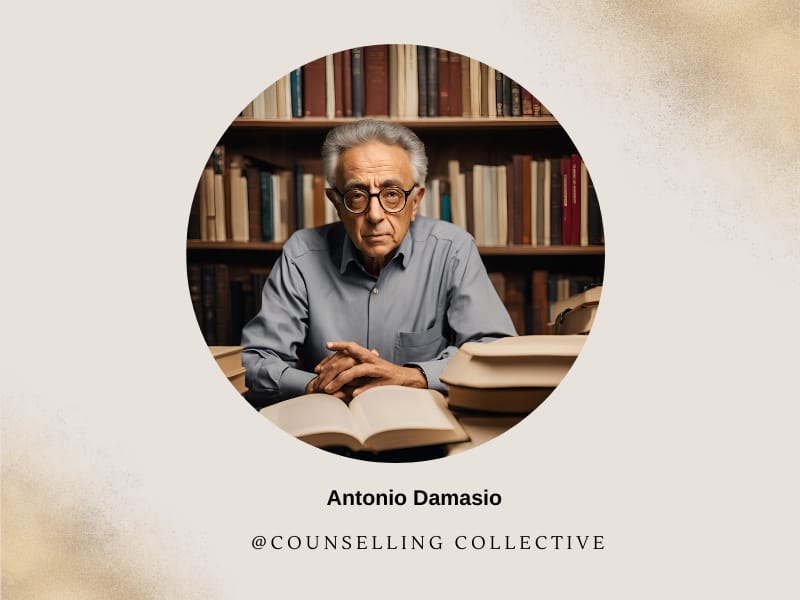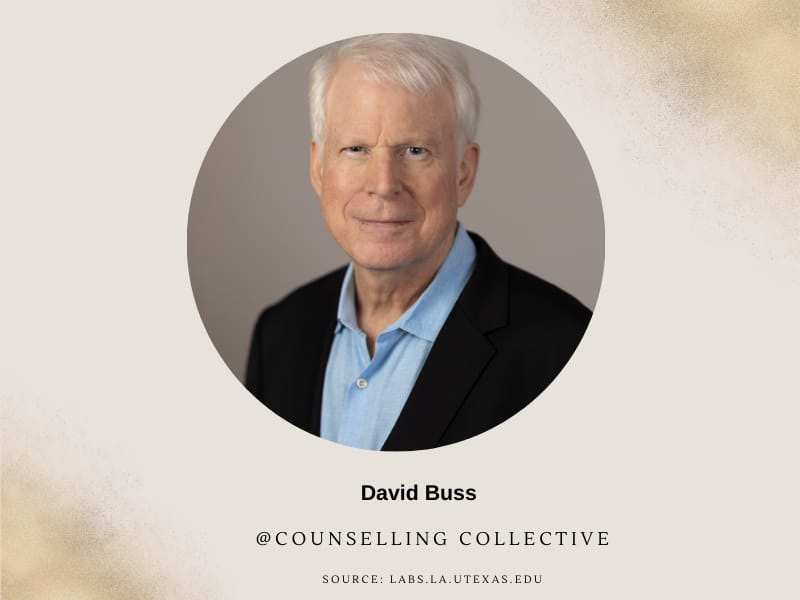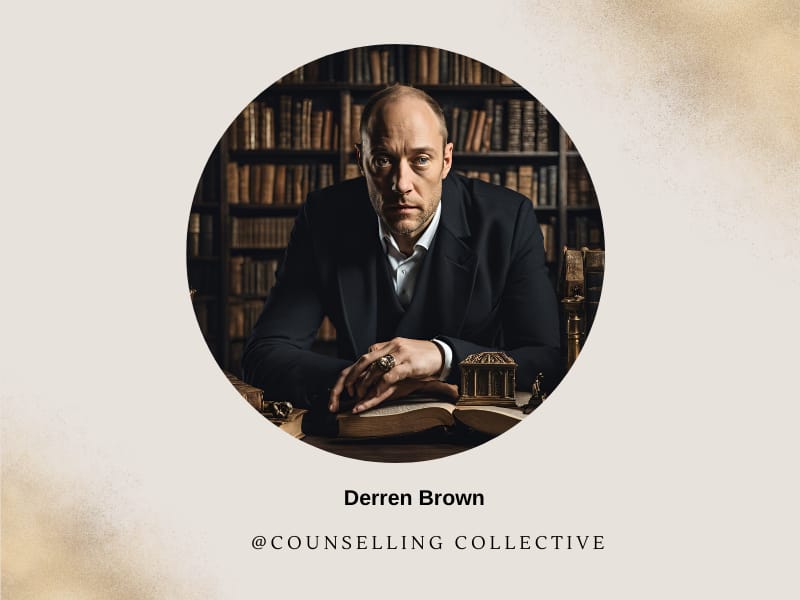Contents
Introduction
Carl Rogers was an influential American psychologist best known for founding the humanistic approach to psychology and developing the client-centered therapy method.
His work emphasized the importance of the self and the individual’s potential for personal growth, revolutionizing the field with his focus on empathy, unconditional positive regard, and the therapeutic relationship.
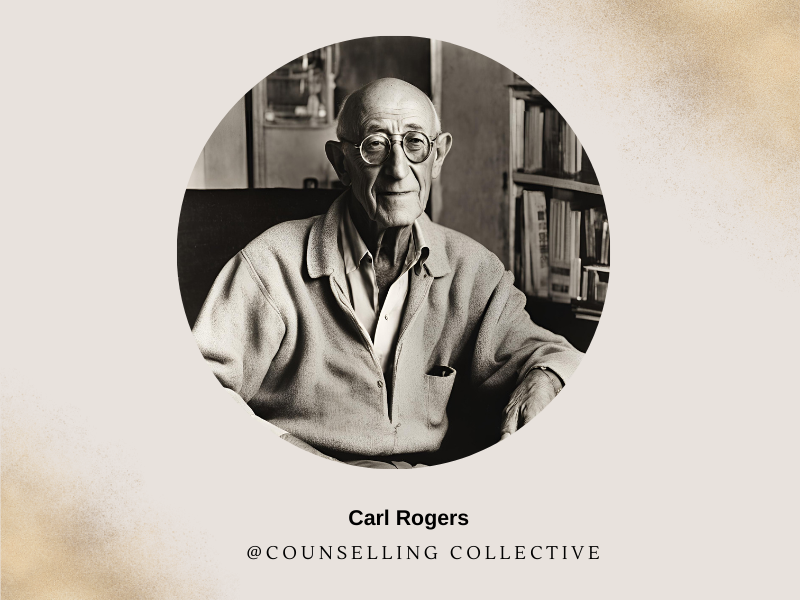
In this article, we will explore Carl Rogers’ influential theories and contributions to psychology. We’ll examine his humanistic approach, key concepts such as self-actualization and unconditional positive regard. Explore more psychologists here
Early Life Of Carl Rogers
In 1924, Rogers married Helen Elliott, and the couple had two children, including their son, David Rogers, born in 1930.
His family life was marked by a blend of personal and professional interests, with a strong focus on empathy and understanding, which he integrated into his therapeutic practices.
Image Source: toolshero.com
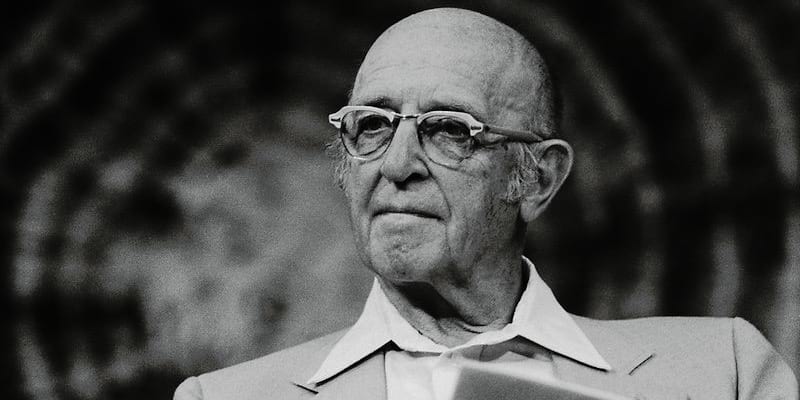
Carl Rogers was born on January 8, 1902, in Oak Park, Illinois, and showed an early interest in understanding human behavior and personal development.
- Family Background: Raised in a strict, religious, and supportive family environment; his father was an engineer, and his mother was a homemaker.
- Education: Initially attended the University of Wisconsin-Madison to study agriculture before shifting to psychology.
- Influences: Carl Rogers’ work with troubled children led him to develop person-centered therapy, a key element of humanistic psychology.
- Early Career: Began his career as a child psychologist at a Christian settlement house, which shaped his later work in humanistic psychology.
Rogers’ move to California in 1963 marked a significant shift in his career. He settled in La Jolla, where he established the Center for Studies of the Person in 1968. This center was instrumental in advancing his humanistic approach to psychology and provided a platform for ongoing research and development in the field.
Though he retired from teaching in 1964, Rogers continued to be an influential figure in psychology through his writing and lectures. His contributions to the field of therapy, particularly his person-centered approach, remained impactful well beyond his retirement.
Carl Rogers passed away on February 4, 1987, in La Jolla, California. His legacy endures through his innovative approaches to therapy and his emphasis on the importance of empathy and personal growth in both personal and professional contexts.
Education Background Of Carl Rogers
| Education Level | Details |
| High School | Oak Park and River Forest High School, Illinois |
| Undergraduate Studies | B.A. in History from the University of Wisconsin–Madison (1924) Initial Major: Agriculture Changed to History, then Religion |
| Graduate Studies | Union Theological Seminary, New York City, Ph.D. in Clinical Psychology from Columbia University (1931), M.A. in Clinical Psychology from Columbia University (1928) |
| Notable Mentors | William Heard Kilpatrick: an influential figure in progressive education and John Dewey’s foremost disciple. Leta Stetter Hollingworth: a pioneer in the field of psychology who made significant contributions to the study of intelligence and gifted children. |
| Field Training and dissertation | Child Study Department of the Society for the Prevention of Cruelty to Children, Rochester, New York |
Theories & Concepts Introduced by Carl Rogers
Carl Rogers made significant contributions to the field of psychology, particularly with his development of client-centered therapy and his humanistic approach.
His work emphasized the importance of self-actualization, empathy, and the therapeutic relationship in promoting psychological growth and well-being.
Image Source: 1966: Psychiatrist Carl Rogers (2R) leading a panel discussing mental health issues. The LIFE Picture Collection/Getty Images
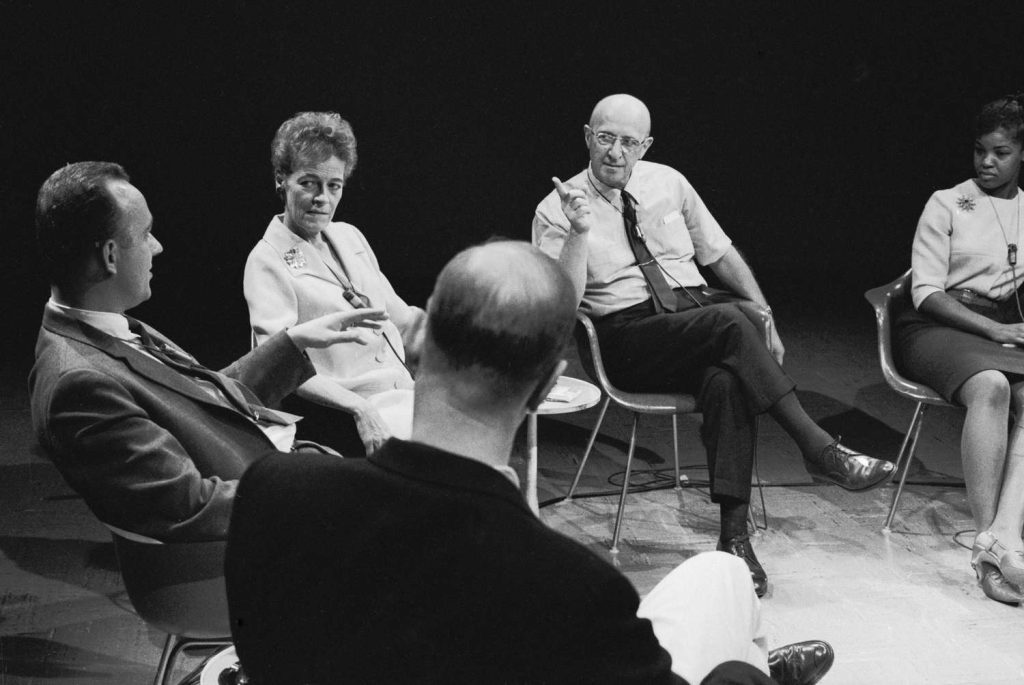
Following table lists the major concepts introduced by Rogers:
| Theory/Concept | Description |
| Client-Centered Therapy | Developed a therapeutic approach where the client leads the process and the therapist provides unconditional positive regard, empathy, and congruence. |
| Self-Actualization | Proposed that individuals have an inherent drive towards realizing their full potential and personal growth. |
| Unconditional Positive Regard | Emphasized the importance of valuing and accepting the client without judgment, which fosters a safe therapeutic environment. |
| Congruence | Described the therapist’s authenticity and transparency in the therapeutic relationship, which helps build trust and effective communication. |
| Actualizing Tendency | The innate motivation of individuals to grow, develop, and achieve their full potential. |
| Experiential Learning | Advocated for learning through direct experience rather than just theoretical knowledge. |
Carl Rogers’ work had a profound impact on psychotherapy and beyond, influencing various aspects of psychology and society. Some of his major influences include:
- Influence on Psychotherapy: Introduced the person-centered approach, emphasizing the therapeutic relationship and the importance of empathy, unconditional positive regard, and client autonomy. These principles remain central to modern humanistic and client-centered therapies.
- Cultural Impact: Rogers’ ideas on personal growth and self-actualization influenced fields such as education, counseling, and social work. His emphasis on the individual’s potential and self-discover has shaped contemporary views on personal development and self-help.
- Academic Institutions: Founded the Center for Studies of the Person in 1968 in La Jolla, California, which furthered research and training in humanistic psychology and person-centered therapy.
9 Notable Experiments and Studies by Carl Rogers
| Patient / Theory Details | Details | Significance |
| The Glenn Project (1961) | Research on the effectiveness of client-centered therapy with children. | Supported the efficacy of person-centered therapy in educational settings. |
| The Fully Functioning Person (1959) | Concept of the fully functioning person | Advanced understanding of personal growth and self-actualization. |
| The Psychotherapy Process (1957) | Dynamics of the therapeutic relationship | Showed the therapeutic relationship’s impact on client outcomes. |
| Rogers’ Research on Congruence (1959) | Role of congruence in therapy. | Emphasized therapist authenticity for client growth. |
| The Therapeutic Relationship (1961) | Impact of the therapeutic relationship on client change. | Demonstrated the importance of therapist attitudes. |
| Chicago Studies (1957) | Conducted a series of studies at the University of Chicago Counseling Center to test the effectiveness of client-centered therapy. | Provided empirical evidence supporting the benefits of client-centered therapy. |
| Study with Gloria (1965) | Participated in the “Three Approaches to Psychotherapy” film series, conducting a session with a client named Gloria. | Provided a real-life demonstration of his therapeutic techniques and their impact on the client. |
| Human Potential Movement (1960s-1970s) | Conducted research and workshops aimed at helping individuals realize their full potential. | Emphasized personal development, self-discovery, and holistic well-being. |
| The Impact of Unconditional Positive Regard (1964) | Effects on client outcomes. | Showing unconditional positive regard fosters a supportive therapeutic environment. |
7 Stages of Fully Functioning Person
Carl Rogers, a prominent figure in humanistic psychology, developed the concept of the “fully functioning person.” According to Rogers, a fully functioning person is one who is in the process of self-actualization, continuously striving to realize their potential and live a fulfilled life.
He identified seven stages of this process:
- Openness to Experience: Fully functioning individuals are open to all their feelings and experiences, both positive and negative. They are not defensive and are willing to accept new ideas and experiences without distorting them.
- Existential Living: These individuals live in the present moment, experiencing life fully as it happens. They do not dwell excessively on the past or future but focus on the here and now.
- Trust in One’s Own Organism: Fully functioning people trust their own thoughts, feelings, and instincts. They believe in their ability to make the right choices and judgments for themselves.
- Freedom of Choice: Such individuals feel free to make their own decisions and are not constrained by external pressures or internal conflicts. They recognize that they have the power to choose their path in life.
- Creativity: A fully functioning person is creative and able to adapt to new situations. They express themselves freely and bring creativity into their problem-solving and everyday life.
- Reliability and Constructiveness: These individuals act in ways that are reliable and constructive for themselves and others. They take responsibility for their actions and aim to contribute positively to their environment.
- A Rich, Full Life: Finally, a fully functioning person lives a rich, full life, experiencing deep satisfaction and fulfillment. They find joy and meaning in their existence and continue to grow and develop throughout their life.
Famous Books and Publications
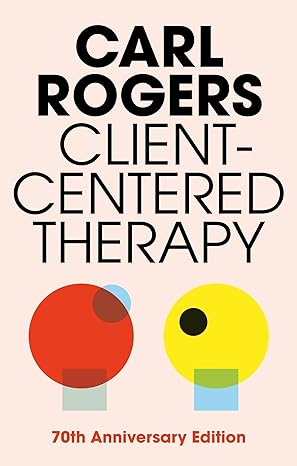
Client-Centered Therapy 1951
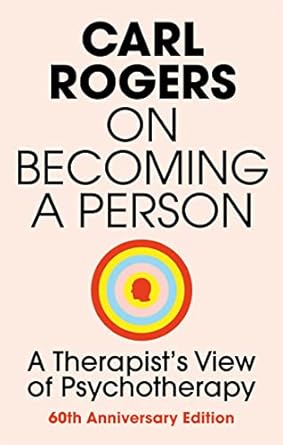
On Becoming a Person 1961
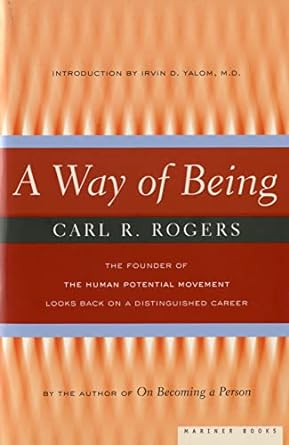
A Way of Being 1980
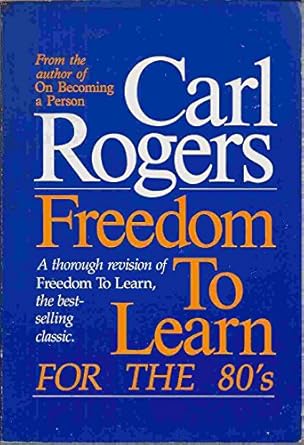
Freedom to Learn 1969
Influence on Contemporary and Future Psychological Research
- Humanistic Psychology: Rogers’ focus on self-actualization and growth shaped humanistic psychology and research on individual potential.
- Therapeutic Practices: The person-centered approach is a key element of modern psychotherapy, impacting therapeutic techniques and client relationships.
- Educational Psychology: Rogers’ principles influence student-centered learning and holistic educational practices.
- Counseling Techniques: Research continues on the effectiveness of person-centered counseling in mental health, education, and community settings.
Psychologists Influenced by Carl Rogers Work
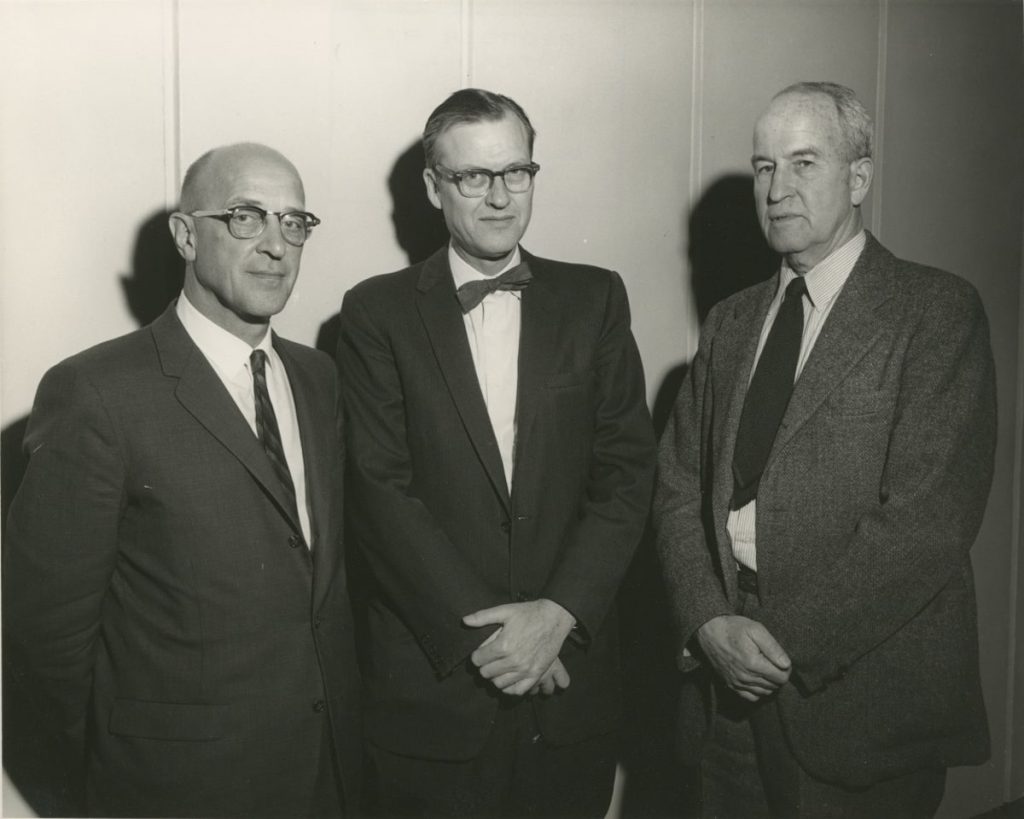
- Abraham Maslow: Developed the hierarchy of needs theory, which shares similarities with Rogers’ concepts of self-actualization and personal growth.
- Rollo May: Integrated existential psychology with Rogers’ humanistic approach, focusing on personal responsibility and the search for meaning.
- James Bugental: Expanded on Rogers’ ideas to develop existential-humanistic therapy, emphasizing the importance of personal meaning and the human condition.
- Virginia Satir: Applied person-centered principles to family therapy, emphasizing communication and empathy within family dynamics.
- Howard K. Butcher: Examined and expanded upon Rogers’ work in the context of psychological assessment and personality theory.
Legacy of Carl Rogers
- Development of Person-Centered Therapy: Established person-centered therapy, emphasizing the importance of empathy, unconditional positive regard, and congruence in the therapeutic relationship.
- Influence on Humanistic Psychology: Made significant contributions to humanistic psychology, influencing therapeutic practices and educational methods.
- Awards and Honors: Received numerous accolades, including the Distinguished Scientist Award from the American Psychological Association (APA) in 1956 and the Award for Distinguished Contributions to Psychology in the Public Interest in 1972.
- Impact on Education and Therapy: His person-centered approach has influenced educational practices and therapy models worldwide, promoting a focus on individual potential and personal growth.
FAQs
What are Carl Rogers’ main contributions to psychology?
Carl Rogers is best known for developing the person-centered approach to therapy, which emphasizes empathy, unconditional positive regard, and the client’s role in their own growth. His work has significantly influenced modern therapeutic practices and humanistic psychology. For more details, see Carl Rogers’ Contributions.
How did Carl Rogers’ early life influence his psychological theories?
Rogers’ early experiences and background, including his upbringing in a religious and supportive family, shaped his understanding of human potential and the therapeutic process. His emphasis on empathy and the client’s self-exploration reflects these early influences. Learn more about his early life in Carl Rogers’ Biography.
What is the person-centered approach according to Carl Rogers?
The person-centered approach, developed by Rogers, focuses on creating a supportive therapeutic environment where clients can explore their feelings and experiences openly. It highlights the importance of empathy, unconditional positive regard, and congruence in fostering personal growth. For an in-depth explanation, visit Person-Centered Approach.
How did Carl Rogers’ work differ from Sigmund Freud’s theories?
While Freud’s theories centered on the unconscious mind and psychosexual stages, Rogers focused on self-actualization and the client’s subjective experience. Rogers’ person-centered approach contrasts with Freud’s more directive and interpretive methods. Compare their theories at Rogers vs. Freud.
What is the significance of the Center for Studies of the Person?
Founded by Carl Rogers in 1968, the Center for Studies of the Person in La Jolla, California, is dedicated to advancing research and training in humanistic psychology and person-centered therapy. It continues to promote Rogers’ principles and methodologies. Explore more at the Center for Studies of the Person.
Conclusion
Carl Rogers’ groundbreaking contributions have profoundly influenced psychotherapy and humanistic psychology. His development of the person-centered approach has reshaped therapeutic practices by emphasizing empathy, client autonomy, and personal growth.
Rogers’ theories continue to inform contemporary psychological research and practice, impacting educational settings, counseling, and personal development. His legacy is sustained by institutions such as the Center for Studies of the Person and the many psychologists who build upon his work.
Bibliography
- [1] Rogers, C. R. (1951). Client-centered therapy: Its current practice, implications, and theory. Houghton Mifflin.
- [2] Rogers, C. R. (1961). On becoming a person: A therapist’s view of psychotherapy. Houghton Mifflin.
- [3] Rogers, C. R. (1980). A way of being. Houghton Mifflin.
- [4] Rogers, C. R. (1969). Freedom to learn: A view of what education might become. Charles E. Merrill Publishing Company.
- [5] Rogers, C. R. (1989). The Carl Rogers reader. Houghton Mifflin.
- [6] Raskin, N. J., & Rogers, C. R. (Eds.). (1989). Carl Rogers’ writings: A comprehensive collection. Houghton Mifflin.
- [7] Bozarth, J. D. (2005). Person-centered therapy: A contemporary perspective. PCCS Books.
- [8] Mearns, D., & Thorne, B. (2007). Person-centered counseling in action. Sage Publications.
- [9] Kirschenbaum, H., & Henderson, V. L. (Eds.). (1989). The Carl Rogers’ approach to psychotherapy. Sage Publications.
- [10] Woolfolk, R. L., & Woolfolk, A. E. (2007). Essentials of understanding psychology. Pearson.

